The upcoming UN Decade of Sustainable Transport (2026–2035) is an international initiative aiming at making the transport sector more environmentally friendly, socially equitable, and economically efficient. The focus lies on reducing greenhouse gas emissions (GHG), promoting clean mobility solutions, and expanding safe and inclusive transportation systems.
The UN Decade also offers an opportunity to bring social justice and inclusion to the forefront of transport policies, planning and implementation around the globe.
Through the international campaign “Call for Impact: No One Left Behind,” the Global Alliance for Feminist Transport emphasizes that this UN Decade of Sustainable Transport cannot be successful if mobility systems do not consider the needs of women, caregivers, and marginalized groups. To better support this the campaign focuses on ten strategic goals – including equitable access, gender-responsive data collection, representation in decision-making processes, and targeted funding – with the goal to dismantle discriminatory structures in the transport sector and enable real participation for all. More than 25 member organizations of the Global Alliance for Feminist Transport have co-signed this Call for Impact already.
Interview with Viviane Weinmann
Sustainable Transport Planner at the Transformative Urban Mobility Initiative and Co-Lead of WomenMobilizeWomen
What was the motivation behind the “Call for Impact”?
The idea emerged spontaneously during one of our Global Alliance for Feminist Transport core group meetings. SLOCAT, who advises the UN on implementing the upcoming UN decade, shared an update on the development of implementation plan for the UN decade. Through this we learned that it was still unclear to what extent and how gender-transformative approaches would be included. With the “Call for Impact,” we want to ensure that everyone involved is aware of both the challenges and the potential solutions for building more inclusive transport systems.
My colleague Hannah Behr presented the ten strategic goals from our Call for Impact campaign at the UN Secretariat in Geneva earlier this week, during the Capacity-Building Workshop on Sustainable Transport. The audience included representatives from UN DESA, regional UN commissions, national governments, multilateral development banks, and civil society organizations. Representing the Global Alliance for Feminist Transport, she contributed perspectives on equity, inclusion, and gender-transformative policies to help shape the Implementation Plan for the upcoming UN Decade of Sustainable Transport.
You can download the “Call for Impact” and the accompanying poster here.
What gaps do you currently see in global transport policy in terms of gender equity?
I cannot speak about concrete gaps – not because they don’t exist, but because we still have a very unsatisfactory data situation. For example, two years ago we commissioned a study in three African cities to better understand women’s mobility patterns and to pilot methods for collecting gender-disaggregated data. Unfortunately, the latter is still often considered a “nice-to-have” rather than a must-have in many transport projects.
One key finding was that sexual harassment is a daily reality for nearly all women when using public transport. However, when asked where transport policy should begin, most respondents said their biggest concern was being able to afford their daily commute – even ahead of their own physical safety. That was a real “aha” moment for me. It showed once again the gaps we face in understanding the intersectional challenges women face globally. For example, how does household income affect women’s mobility behavior? And what about other factors such as religion, ethnicity, precarious employment, etc.?
Why is now the right time to make these demands?
The sustainable mobility community has made solid progress in recent years in closing knowledge gaps on the topic of gender & sustainable mobility, developing best practices, and raising awareness beyond the “gender & mobility bubble.” Now is the time to scale up this knowledge and put it into action. After all, what good are the best ideas if they don’t reach and benefit the broader public?
The UN Decade is a fitting occasion to proactively shape the next ten years under the umbrella of the UN. We all must ensure that gender-transformative and inclusive mobility approaches are integrated. Unfortunately, the goals of the UN Decades are not legally binding – meaning it’s up to individual member states to take initiative. That poses risks, but also opportunities – at least for those who seize them!
